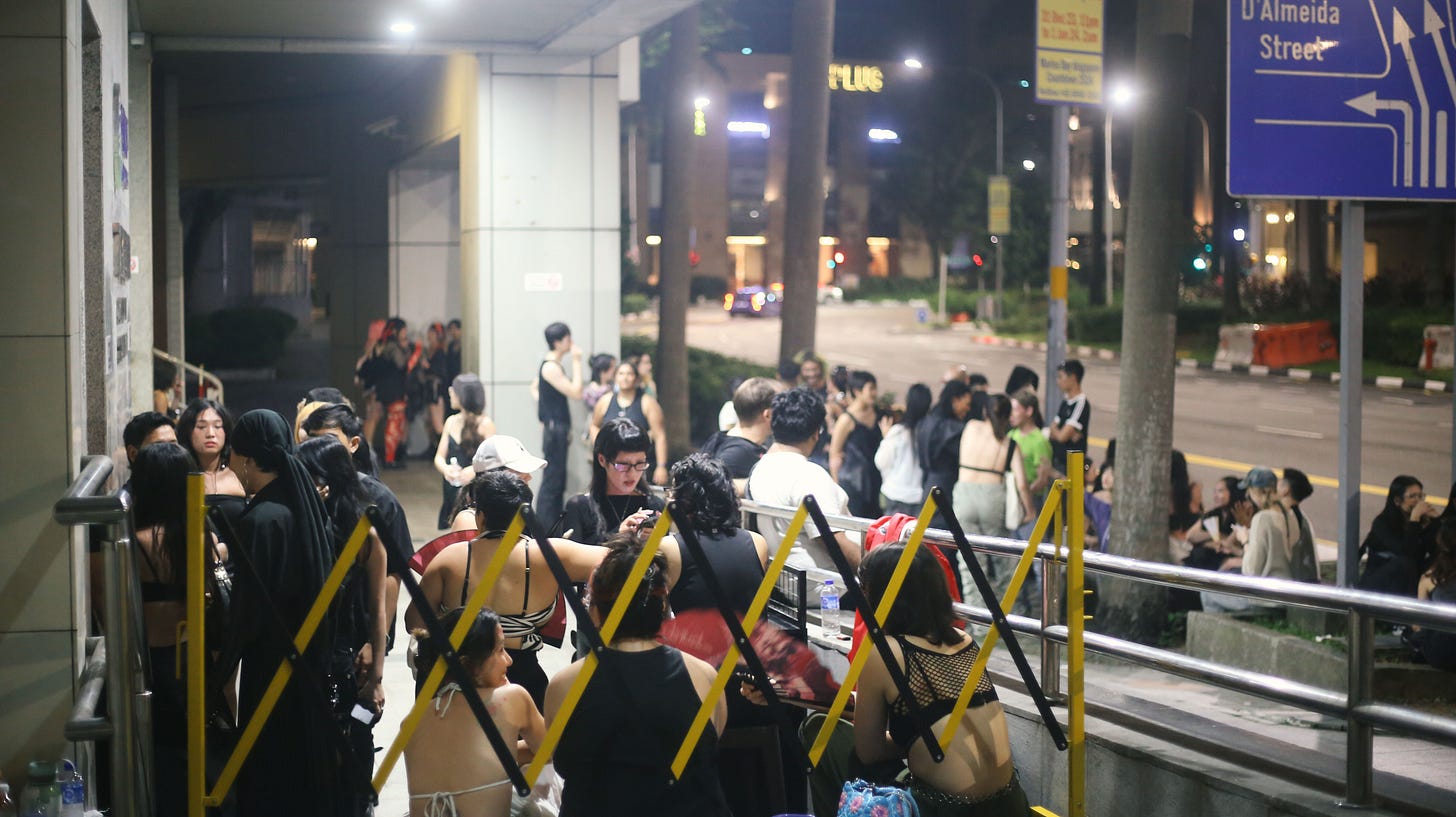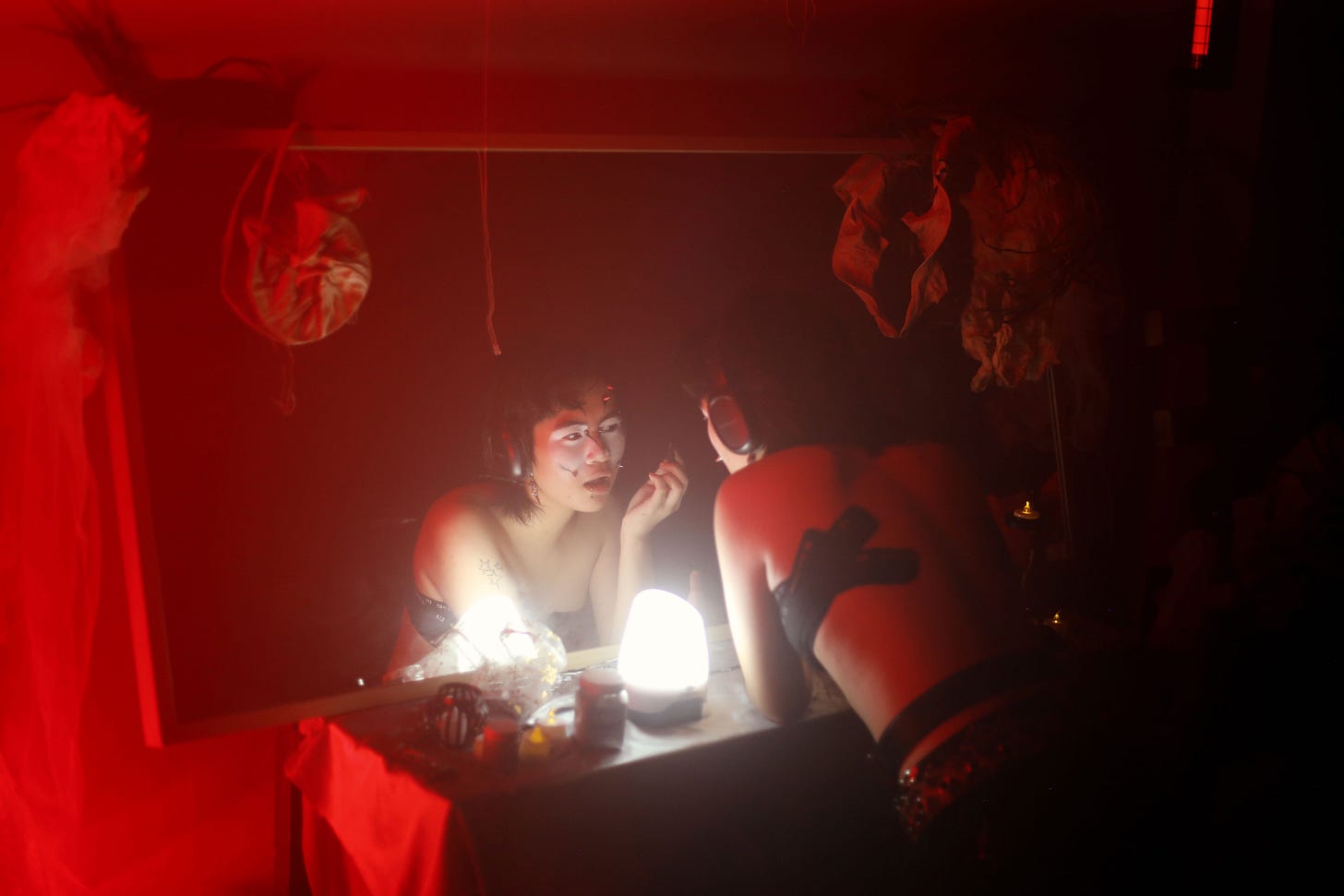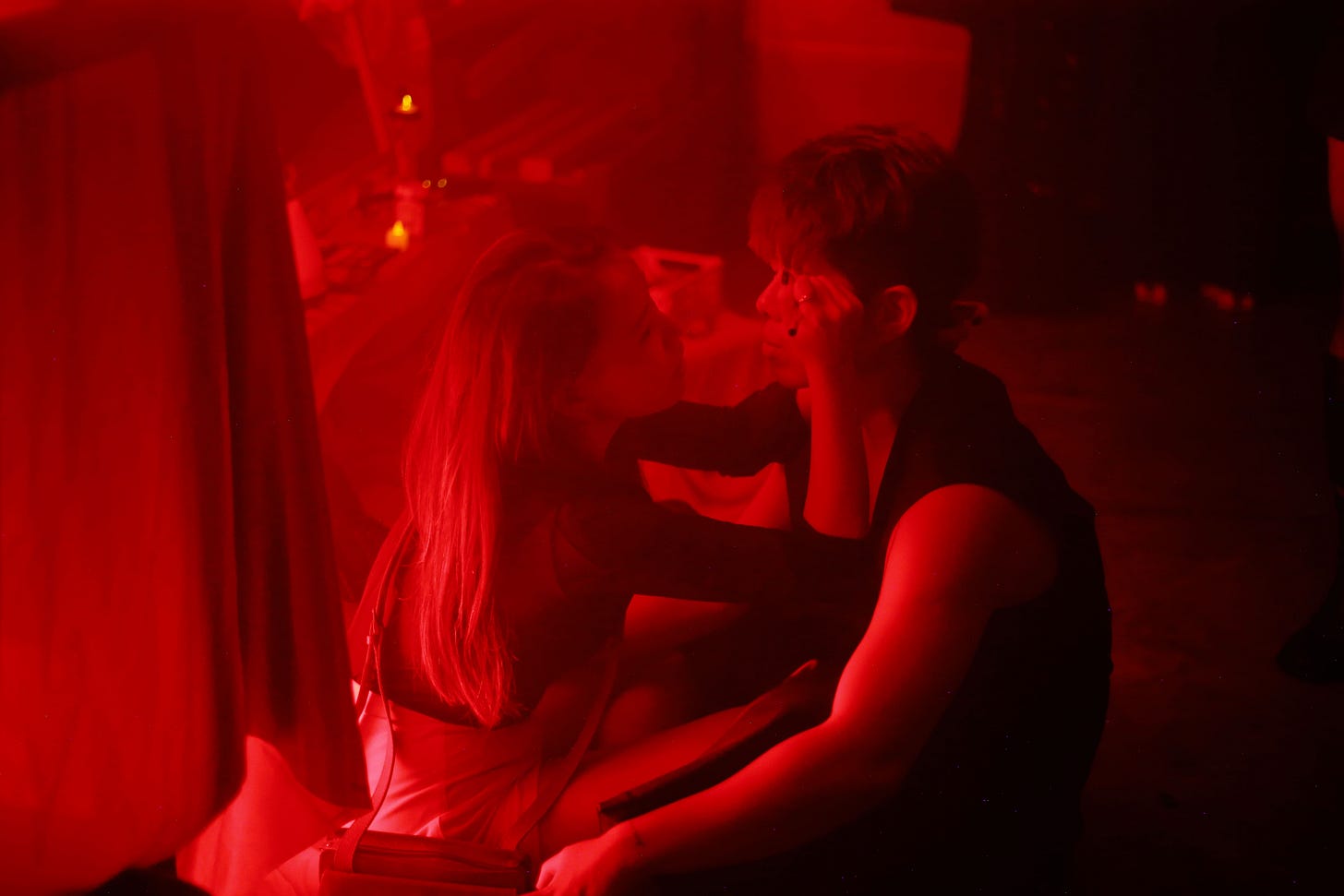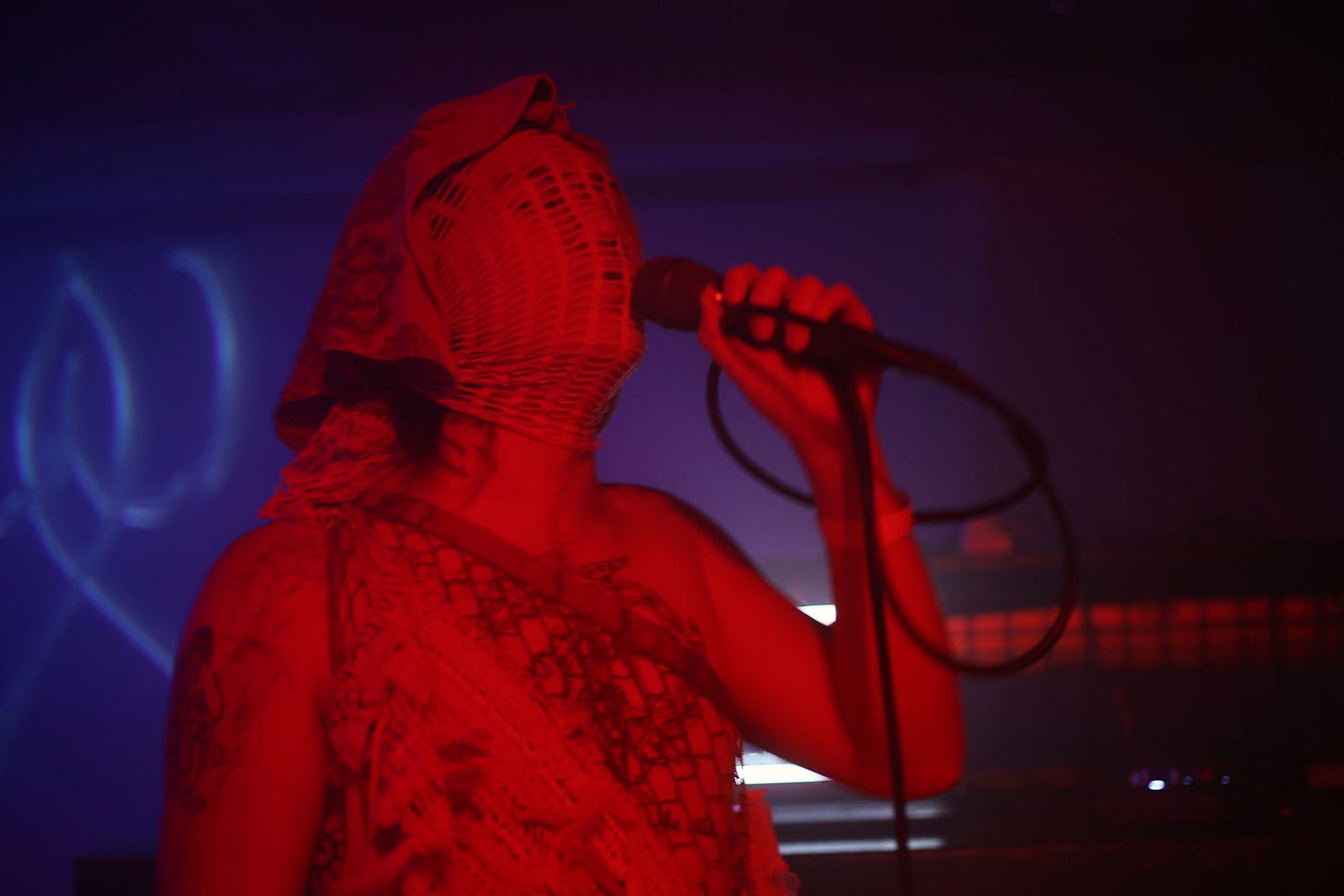NORMCORE SINGAPORE'S MUTANT QUEER FUTURE
Finding the glitch in our default programming
i dream of a blasphemy. we come from surrogate wombs, gestated by our own hands. the haraway cyborg emerging beyond holy dualisms now archaic: i am nature-machine-human-animal-the ideal-the material.
metamorphosis is moot, change is our only god. our limbs detachable, pharmaco-interventions abound. synapses rush thoughts from the other side of the net into our consciousness.
in me is the universe, delivered through data. our bodies an altar, a home for multiplicities: embodying i—you—networks—pulses—what has been—what will be—an infinite interflow of subjectivities…a mutant queer future. — Bussy Temple event description for “Xenoflesh, December 2023
The rave was happening in the crosshatches of the central business district, after the suits clock out and the skyscrapers turn into glossy sheets of black. A lonely security guard watching million-dollar sculptures in an office lobby points me towards the unmarked venue, up a flight of stairs from an Indian bank building with gray tiles chipping off the walls.
In Singapore the best raves are in repurposed cathedrals to late-stage capitalism: a dead mall on the brink of demolition, a bitcoin factory in the red-light district, the top floor of a movie theater multiplex. Perhaps these sites reflect the ingenuity of ravers living in a surveillance state with a land shortage so severe that it scavenges earth from the oceans, building hallucinatory new landscapes on reclaimed ground. The best places to hide a rave in a panopticon are the blind spots of global capital.
So I hit my stride through the streets, and clock an older Chinese lady outside the 7/11 ogling my ass-grazing skirt. It’s been a while since I’ve been stared at like this—mouth agape, gaze blunt, eyes oozing with Biblical judgment. It elicits in my body a shrinking curl of shame—ah yes, that Catholic programming—and I wrap a layer of black lace over my body as if folding back exposed flesh. But as I get closer to the party I see bodies splayed on the sidewalk in leather bikinis, taped tits, studded garter belts, bleached brows, metal face cages, furry animal boots—a feast of post-apocalyptic couture for eyes accustomed to grazing the sterile street style of normcore Singapore.
So I shrug off the extra layers and make a joke about hiding my ass from my dad as I pranced out of my family’s house this evening, and the ravers laugh because they get it. That stunted state of adult-childhood that marks the downwardly mobile spiral of freaks pressed under their parents’ roofs in the most expensive city in the world.
Yup, they get it.
The rave is called Bussy Temple and it started in an abandoned tunnel. A crew of friends thwacked through the jungle with a speaker on their shoulders so they could dance to hardstyle with no one but the birds to judge them. Since the pandemic, as Singapore’s rave renaissance bloomed, the party carved its niche in the queer underground through an ethos that centers trans and femme bodies. (“Bussy” is a portmanteau of boy + pussy, I’m told.)
Bussy Temple’s dancefloors are fueled by Gen Z’s chaos energy, and the DJs possess a demonic inclination towards more barbed and metallic shades of dance music. When I ask co-founder Metamoksha why they prefer playing genres like industrial hardcore and hard trance over 4x4 techno, they shout “it’s better to release my trauma!” and throw their head back with a laugh. They grow serious when I mention wanting to film the party for a documentary. “I know queer raves are very trendy right now,” they say. “But I want you to know this is a family.”
I slip past the entrance where the door person is dealing with a group of white expats who seem confused about whether they should come in, their entitlement flipping into outrage when they do not perceive a warm welcome. Not my problem.
Flying up the stairs I enter a mirrored antechamber called The Sanctuary, set up as a makeshift dressing room with vials of lip gloss and glitter, makeup brushes, and palettes of powders laid out on a low table. “Use this as an opportunity to learn from each other, and get ready with queer kin,” the organizers advised, encouraging guests to share tips on things like wearing eyeliner or drawing on a mustache— “anything that gives you a sense of gender euphoria.”
The Sanctuary thrums with a diffused stranger-intimacy. A trans teenager with a beauty of mythical proportions asks me to check her eye glitter, then giggles as she shows me her Grindr. A cutie with a bound chest draws a mustache above their lips. An older woman teeters in alone, self-consciously twirling an off-kilter wig as her gaze flicks around the room. The teen looks up at her and coos, “You’re beautiful!”
The Sanctuary reminds me of the fragile beauty of safe spaces operating under real political threat, rather than the pained discursives of online discourse. Trans culture is pretty much invisible in Singapore, a socially conservative country where even homosexuality was illegal until the state repealed Section 377A, a colonial-era law criminalizing sodomy last year. This liberalizing gesture was quickly tempered by a reactionary counter-move, as politicians passed a constitutional amendment blocking gay marriage. The precarity seeps down to the raves: at a previous Bussy Temple party, parents allegedly barged into the Sanctuary to drag their queer children home (…mom, you’re so embarrassing!!!)
A low growl draws me through a black curtain onto the dancefloor. Red lights pool across the room, giving the lingering sensation of swimming in a purgatorial underworld. Black silhouettes surround a mutant creature named Baben who is dripping in netting and scales, webbed face contorted into a black howl. The songs are like underwater seances for deep sea creatures, distorted vocals murmuring hymns for the dead over swampy trap beats.
Much has been written about the chaos-trans voice, the emerging theory that (predominantly) queer and trans musicians like SOPHIE and 100gecs have been using vocal modulation techniques like auto-tune and pitch-bending to deconstruct gender and venture into a post-human futurity belonging to both the body and the cloud. Baben’s vocals, pitched all the way down, conjure the inflection point where trans-humanism glitches into the demonic realm.
And it’s that voice that carried me. I haven’t gone crazy for a voice like this since babyxsosa, another one who makes me cry on command. But if baby’s like the lethal sweetness of a fentanyl lollipop, Baben is the mutant-machine-mystic singing lullabies in a ditch, waiting for the gods’ arrival. This voice twisted into the cracks of me keeping it together. Burying into the confusion I’m composed of. The alienation that splits me whichever side of the world I sleep on. The guilt that sent me running back. The accelerating decay of my grandmother, the person I already miss the most. Some things are still too raw to be tamed.
Keep reading with a 7-day free trial
Subscribe to Rave New World to keep reading this post and get 7 days of free access to the full post archives.





